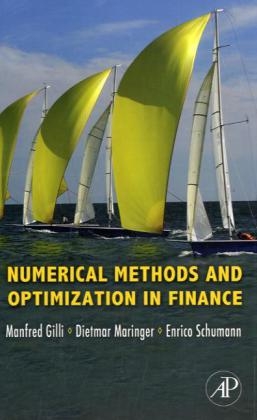Read more
Informationen zum Autor Manfred Gilli is Professor emeritus at the Geneva School of Economics and Management at the University of Geneva, Switzerland, where he has taught numerical methods in economics and finance. He is also a Faculty member of the Swiss Finance Institute, a member of the Advisory Board of Computational Statistics and Data Analysis, and a member of the editorial board of Computational Economics. He formerly served as president of the Society for Computational Economics. Dietmar Maringer is Professor of Computational Economics and Finance at the University of Basel, Switzerland, and a faculty member at the Geneva School of Economics and Management. His research interests include non-deterministic methods such as heuristic optimization and simulations, computational learning, and empirical methods, typically with applications in trading, risk, and financial management. Enrico Schumann holds a Ph.D. in econometrics, an MSC in economics, and a BA in economics and law. He has written on numerical methods and their application in finance, with a focus on asset allocation. His research interests include quantitative investment strategies and portfolio construction, computationally-intensive methods (in particular, optimization), and automated data processing and analysis. This textbook teaches readers steps for solving specific problems in finance and applying them to other problems. After a short introduction about numerical analysis, the authors devote two sections to pricing financial models and simulation to prepare readers for the book¿s core subject, optimization. Assuming that a model is only as good as its results, they provide a comprehensive overview and treatment of heuristic optimization techniques, only briefly touching upon standard methods. Arguing against judging models by the elegance of their math or whether it fits nicely into a theoretical framework, they advocate a pragmatic approach: implementing models to gain intuition about them. They provide sample code in the text, primarily MatLab and R and offer code for download at the book¿s website. This practical textbook can serve equally well as a self-contained desk reference. Describes computational finance tools. This title covers fundamental numerical analysis and computational techniques, such as option pricing, and gives special attention to simulation and optimization. It shows ways to build and implement tools that help test ideas. It focuses on the application of heuristics....
List of contents
1. Introduction
I. Fundamentals
2. Numerical Analysis in a Nutshell
3. Linear Equations and Least-Squares Problems
4. Finite Difference Methods
5. Binomial Trees
II Simulation
6. Generating Random Numbers
7. Modelling Dependencies
8. A Gentle Introduction to Financial Simulation
9. Financial Simulation at Work: Some Case Studies
III Optimization
10. Optimization Problems in Finance
11. Basic Methods
12. Heuristic Methods in a Nutshell
13. Portfolio Optimization
14. Econometric Models
15. Calibrating Option Pricing Models
Report
"This book aims at providing guidance which is practical and useful for practitioners in finance with emphasis on computational techniques which are manageable by modern day desktop personal computers' processing power when building, testing, comparing and using mathematical and econometric models of finance in the pursuit of analysis of actual financial market data in day to day activities of financial analysts, be they students of courses in finance programs or analysts in financial institutions." --Zentralblatt MATH 2012-1236-91001
"With as much rigor as can be mastered by anyone in the still-developing field of computational finance and a sense of humor, the authors unravel its mysteries. The presentations are clear and the models are practical --- these are the two ingredients that make for a valuable book in this field. The book is both practical in scope and rigorous on its theoretical foundations. It is a must for anyone who needs to apply quantitative methods for financial planning --- and who doesn't need to in our days?" --Stavros A. Zenios, University of Cyprus and the Wharton Financial Institutions Center
"Numerical Methods and Optimization in Finance is an excellent introduction to computational science. The combination of methodology, software, and examples allows the reader to quickly grasp and apply serious computational ideas." --Kenneth L. Judd, Hoover Institution, Stanford University

